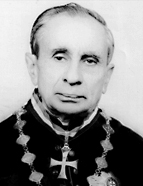

In this regard, it is worth noting that in 1979, together with Rui de Azevedo and Marcelino Pereira, he published Documentos de D. Sancho I (1174-1211), while the following year, still collaborating with the esteemed researcher Rui de Azevedo, he initiated, unfortunately without continuity, the publication of Documentos Medievais Portugueses - Documentos Particulares (1116-1123), under the auspices of the Academia Portuguesa da História .
What can we say about the significant contribution he made to the understanding of the ecclesiastical culture of the Kingdom of Portugal in the Middle Ages, through the publication and study of inventories of libraries and treasures such as those of Braga and Coimbra — works that are essential reading for any medievalist — as well as diocesan legislation, including constitutions and synods?
The sometimes exhaustive task of editing Latin and Portuguese documents, whether loose or part of medieval collections, is based on the conviction that, as our biographer wrote in 1973: "It is not enough to have documents. Researchers need to be able to use them reliably in order to write history scientifically based on them, rather than reconstructing it through conjecture." He reinforced this timeless line of thought, adding: "But the document, like a diamond, has to be properly worked on, because it can be useless to the researcher if it is inaccessible or unintelligible to him."
In AJC's scientific career, it is abundantly clear that he drew upon a multitude of disciplines, which we have already mentioned, as well as others such as medallistics and linguistics. Fundamentally associated with philology, he sought to determine the historical and cultural contexts necessary for the study of literature, history, and philosophy, among others. A paradigm of this approach is the magnificent work Os mais antigos documentos escritos em Português. Revisão de um problema histórico-linguístico [The Oldest Documents Written in Portuguese: Revision of a Historical-Linguistic Problem], published in 1979. It was then unanimously recognised, both inside and outside Portugal, as an exemplary piece of research, argumentation, and critical dating.
